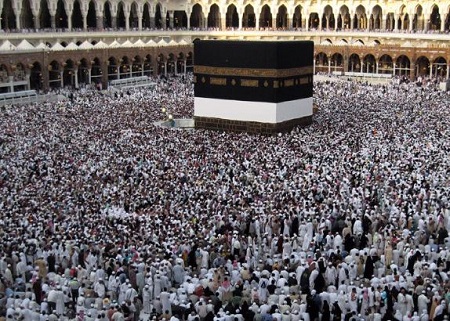Hot Stories
Recent Stories
Hajj 2019: Five Nigerian Pilgrims Die In Saudi Arabia
Posted by Victor on Wed 31st Jul, 2019 - tori.ngIn terms of wellbeing of pilgrims so far on the medical side, we are yet to encounter any serious situation or potential outbreak of any disease, except for the extreme temperatures.

National Hajj Commission of Nigeria on Tuesday confirmed the death of five Nigerian pilgrims in Saudi Arabia.
The Chairman of the National Medical Team, Ibrahim Kana, released the figure Tuesday in Madinah from the commission’s National Medical Team Electronic Health Medical Records.
“So far, Nigeria has lost five pilgrims including three females and two males; out of which one died in Madina while the remaining four died in the city of Makkah.
“They all died of various illnesses including heart and lung diseases.
“Records shows that so far in both Makkah and Madina, we have made 10, 485 diagnosis with Makkah accounting for over 60 per cent.
“Additionally, 108 referrals were made to various Saudi Arabian hospitals after keeping 45 pilgrims on observation for variety of illnesses in the four facilities in Madina and another five in Makkah.
“In order to ameliorate suffering of pilgrims, all the clinics are located within a stone throw to pilgrims’ accommodation in both Makkah and Madina,” he stated.
Over 150 million drugs had been consumed by Nigerian pilgrims at no cost to them, the record showed.
“The National Hajj Commission of Nigeria prepared a drug forecast for the entire operation, including drugs for HIV/AIDS and Tuberculosis, donated by the Federal Ministry of Health.
“The remaining was procured by the commission, both onshore and offshore, following government due process.
“In terms of wellbeing of pilgrims so far on the medical side, we are yet to encounter any serious situation or potential outbreak of any disease, except for the extreme temperatures.
“We admonish our pilgrims to stay indoors as much as possible.
“If they must go out, they should cultivate the use of umbrellas and consume plenty of cold water,” he said.
Regarding concerns of the deadly Middle East Respiratory Syndrome Corona Virus (MERS-CoV), Mr Kana said pilgrims were strongly advised to stay away from camels which were the reservoir and vector for the transmission of the disease.
“We appeal to pilgrims to eat healthy and not patronise illegal food vendors to prevent cases of gastroenteritis as a result of food poisoning.
“Similarly, pilgrims are strongly advised not to consume stale foods which get easily contaminated as a result of the high temperatures.”
He also advised pilgrims to attend the health centres opened for them, reminding them that they were free to make use of the free services and called on the health personnel to be cautious and humane to “the guests of Allah.”
Mr Kana said all the NAHCON clinics were fully computerised, “therefore, pilgrims with the habit of patronising clinics just to receive drugs would not be able to do that this time.”
Top Stories
Popular Stories
Stories from this Category
Recent Stories





















































